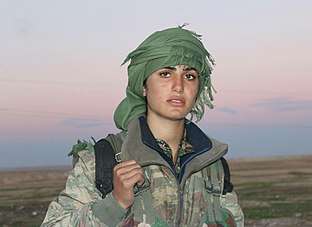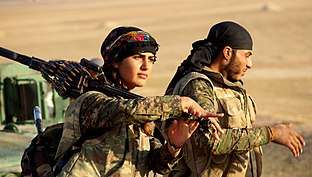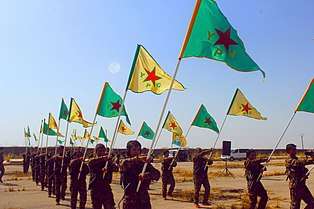Asia Ramazan Antar
Asia Ramazan Antar (1997–2016) also known as Viyan Antar, was a Kurdish Women's Protection Units (YPJ) fighter who has become a symbol of the feminist struggle in the Rojava conflict and in the fight against ISIS by international media.
Asia Ramazan Antar | |
|---|---|
 | |
| Born | 1997 Qamishli, Syria |
| Died | 30 August 2016 (Aged 19) Manbij, Syria |
| Allegiance | |
In 2014, at the age of 16, Antar joined the Women's Protection Units with the aim of fighting against the Islamic State. After photos of her spread across the internet, she was dubbed "the Kurdish Angelina Jolie" by international media for her physical resemblance.[1][2][3] These comparisons led to repudiation by other Kurdish fighters and activists of the Kurdish cause who described the comparisons as sexist and objectifying.[4]

Early life
Born into a Kurdish family, Asia married very young through a marriage arranged by her family. However, after three months, she was able to get divorced thanks to new laws in the Kurdish region following the Rojava conflict. In 2014 after her divorce, she joined the ranks of the Women's Protection Units (YPJ) with the ideal of fighting for the emancipation of women from the hands of patriarchal oppression in the region.
The information given by Western media regarding her age has been inconsistent, although YPJ commander Abdullah Shirin confirmed that she was born in 1997 and was 19 years-old when she died.[5]
Transcendence in the media
Antar gained international attention in 2015 when a photojournalist took photos of her and described her as "the Kurdish Angelina Jolie." Many media sites recirculated the photos, turning it into news and also comparing her with Spanish actress Penélope Cruz.
After she died, it was news once again, and news headlines were reduced to "the Kurdish Angelina Jolie has died," emphasizing at all times the physical resemblance between the two and rarely discussing her participation in the fight against ISIS. This was condemned by supporters of the Kurdish cause and even other fighters.[4][6]
Reactions and accusations of sexism
The minimization of her as a person was seen as demeaning by many Kurdish activists, especially given Asia's feminist leanings. Choman Kanaani, an activist and Kurdish fighter who repudiated the Western media's treatment of Asia, told the BBC that, "The entire philosophy of YPJ is to fight sexism and prevent using women as a sexual object," in reference to the YPJ's position on sexism. He added:
We want to give women their rightful place in society and for them to own their own destinies. Viyan died for these ideals. In the media, no-one talked about the ideals for which she gave her life, nor what Viyan achieved for women in Rojava in the past four years.[4]
Death
Asia was killed during an attack in the city of Manbij after participating in the liberation of the city from the hands of the Islamic State at the Manbij offensive.[7] Although initial reports indicated that she along with other People's Protection Units (YPG) fighters had died near Jarabulus as a result of attacks by the Free Syrian Army, these rumors were discarded when the spokesman of the YPJ confirmed she died in an Islamic State attack.[8]
See also
References
- Nelson, Sara. "Asia Ramazan Antar - 'Killed While Fighting ISIS'".
- Lion, Patrick. "Female soldier dubbed the 'Kurdish Angelina Jolie dies' while fighting ISIS in Syria". Mirror.
- McKernan, Bethan. "Kurdish 'Angelina Jolie' fighter reportedly killed fighting Isis".
- Gol, Jiyar. "Kurdish 'Angelina Jolie' devalued by media hype". BBC.
- Coghlan, Tom. "Heroine of the Kurds dies fighting ISIS suicide attack". The Times.
- Olmert, Josef. "The Kurds Are Betrayed Again — Never Mind Angelina Jolie".
- "Kurdish Angelina Jolie Killed in Rojava". basnews.
- Francis, Nathan. "Asia Ramazan Antar killed: 19-year old called 'kurdish Angelina Jolie' sacrifices her life to stop ISIS suicide bombers". Inquisitr.
